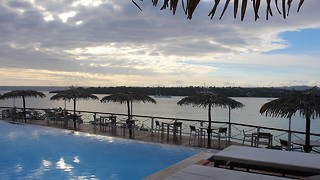D.B.C. Pierre
catches up with the Man Booker prize-winning ‘bad boy’ of literature to talk ducks, Mexico and Sean Paul
I first contacted D.B.C Pierre in 2005 while organising speakers for The Shirley Society. My list of contactees included the ‘turn up to the opening of an envelope’ celebs to the A-list, who I never expected to reply anyway. D.B.C certainly fell into the latter. Over the following fortnight, emails flooded into my inbox, including “Lord Archer is too busy at the moment but sends his regards”. Spiffing. Amidst all these arrived an email from a recipient simply called ‘Pierre’ (none of your Lords and Ladies here):
“Tess, Thanks for your invitation - I'd be chuffed to come up, though I don't know what I would talk about.”
Here was the Man Booker Prize winner, renowned for his outstanding (and outstandingly shocking) debut novel, Vernon God Little, now writing his eagerly-anticipated second novel, Ludmila’s Broken English, and he didn’t know what he would talk about? Self-effacing? Yes. Self-doubting? Perhaps: “Seriously, I’m sure you’ll think of something… If all goes tits up, there’s a lot of free wine.”
A plan was hatched and we were to be in touch in the New Year to arrange a date. This is where it all fell apart. D.B.C Pierre, born in Australia, brought up in Mexico, now lives in Ireland so visiting Cambridge would have to tie in with a trip to London. The next email arrived: “Looking forward to meeting you and to that wine you mentioned. I’m over late March – when suits you around then?”
Optimistic I might be, but there’s no point arranging a talk in the middle of the holidays. “Can we try a bit earlier?” I timidly replied but, no, after a tour to promote the book, Pierre was off to spend some time in Latin America and that, it seemed, was that.
Or so I thought. An apologetic email promised he would “make it up to me” and a few months later I found myself sending out a similar email barrage, now as Varsity Interviews Editor, including one to Pierre: “Tell me to leave you alone forever and I will. However, if you’d be up for a short interview, you’ll be the star of Cambridge for the week and that’s great publicity (?) Hope Christmas was great. I went and fed ducks; always exciting.”
The reply came the next day. “Still feel rubbish for letting you down. Let’s do that interview. I ate duck if that counts?”
Next hurdle: what do I ask the man described by the god of all knowledge – Wikipedia – as someone who spent “nine years in a drug-induced haze” and “was involved in illegal and unprofitable schemes”? Starting by asking about his choice of pen-name ‘Dirty but Clean’ seemed a tad feeble.
I begin with a simple inquiry about his current writing: “Listen, I’m on fire with it as we speak. This one’s been brewing a while now – very decadent novel about sexual excess and the tragedy of love – or how exquisitely meagre love can appear next to the vast excesses of the mind.”
Suddenly I see beyond the scandalous Wikipedia-type articles which present D.B.C as some crazed bad-boy come good. I see a passionate writer who cares deeply about art, music and watching the world go by. From there, the interview takes off. Today he is “having a strange Ian Dury phase, interspersed with Rachmaninov and Sean Paul. Not reading at all just now, though the possibility of it fills me with spirit.”
Apparently he read no fiction at all last year, “apart from world news.” The latest Man Booker winner, Kiran Desai’s book “sounds a beauty though” and he’s added it to his ever-growing reading list. At the moment, however, his head is “too full of fiction to make much space for any more.” Our book conversations continue, “I have absolutely no idea where anything fits in terms of literary trends. I still find Machiavelli contemporary. Is that alright?” Again, that apologetic self-doubt reappears through the confident exterior.
Pierre prefers to consider himself Mexican, but how do concepts of belonging and nationality affect his writing? “Geographical upbringing colours the fabric of who you are. Some were taken aback with the lurid volume and speed of Vernon – I came to wonder if it wasn’t actually a Latin American novel originated in English. Its human speed seemed quite natural to me.”
Speed equates with a Mexican way of life? “Basically, yes. Many of the things people find implausible or overdone in my work, I find perfectly realistic. That sounds bloody Mexican. Hot pink and green and excessive.” The balance between reality and fantasy arises again when I ask him what he would be doing if he wasn’t an author. “A good answer lies somewhere in the space between what I’d like to be doing and what I could be doing. I’d like to be composing and conducting vast symphonies that rip the hearts out of audience’s chests. But, I can’t play an instrument, so I should just be content with staying out of jail.”
He is succeeding admirably; his new year’s resolution is to “write ‘til I weep. Or rather, write ‘til you weep”, he is living up a mountain – being “dragged up and down by the dog suffices for sport” – and he has cleared his debts, bar one minor creditor who he’s yet to “track down”. What’s more, a stage-play of Vernon is coming to The Young Vic in April, adapted by Tanya Ronder and directed by Rufus Norris, “meaning it should be hot, though I’ve no idea what they’re up to”.
By this point, we’re almost out of time. “Listen, don’t let things get on top of you, that’s where mistakes are made. One thing that might be neglected in the current top end of academia is your emotional life, which, in the end, is what will save or sink you. Go and taste the edges, the assignment will wait.”
 News / Academics lead campaign against Lord Browne Chancellor bid2 July 2025
News / Academics lead campaign against Lord Browne Chancellor bid2 July 2025 News / Lord Mandelson visits University30 June 2025
News / Lord Mandelson visits University30 June 2025 Features / 3am in Cambridge25 June 2025
Features / 3am in Cambridge25 June 2025 News / John’s students call on College to divest1 July 2025
News / John’s students call on College to divest1 July 2025 News / Clare students call on College to divest3 July 2025
News / Clare students call on College to divest3 July 2025







